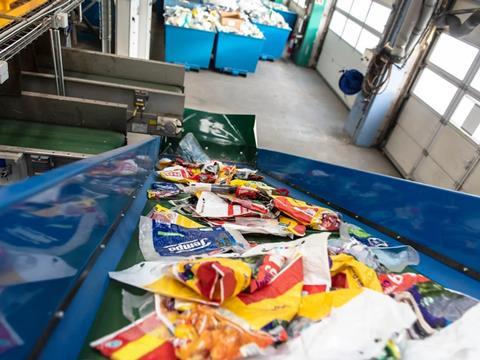
The HolyGrail 2.0 initiative is entering its final phase of R&D trials to prepare for market entry and the launch of a pilot market in France in 2024 – involving sorting and reprocessing trials for digitally watermarked rigid packaging, flexible plastics, and more.
With the incoming mandates for recycled plastic content in packaging scheduled to take effect in 2030, it is hoped that the technology will be validated at the highest technical level, TRL9, or ‘actual system proven in operational environment’.
The tests will involve the detection, sorting, and ejection of polypropylene flexibles produced by PepsiCo and LDPE flexibles by Essity and P&G; Hündgen Entsorgung’s Materials Recovery Facility will host granular sorting trials.
The same site will oversee a three-month sorting trial for digitally watermarked rigid packaging for the Danish and German markets. Two prototypes from Pellenc ST and Digimarc will be used by a team of HolyGrail 2.0 members for testing.
Phase 3 will then be completed with two industrial-sized recycling tests conducted by Borealis, in which polypropylene and polyethylene flexible fractions will be collected at Hündgen Entsorgung. Meanwhile, Indorama Ventures will test the separated non-food PET bottle stream from the rigid trial at its recycling plant in Verdun.
At the same time, a new workstream has commenced within the project to execute a French pilot market in 2024. Seven member companies have collaborated thus far in a bid to roll out the technology on the HDPE rigid packaging market and prove the capability of advanced sorting via digital watermarks.
A French EPR organization and Citeo will support the project, while Henkel, L’Oréal and P&G plan to expand their HDPE rigid packaging portfolios with digital watermarks in the coming months. The post-consumer waste will be collected at kerbside and separated into non-food HDPE and non-enhanced packaging waste at Veolia’s PlastiLoop Brenouille facility.
A specific granular sorting trial for enhanced HDPE rigid packaging will follow. This will separate detergent and cosmetic packaging into separate streams to be reprocessed – hoping to develop Fit-for-Use detergent and cosmetic rHDPE grades, respectively.
The initiative anticipates a smooth transition between the R&D phase and commercial launch of HolyGrail 2.0 technology, with a successful pilot market hoped to demonstrate technical and economic benefits. Participating companies are expected to gain practical knowledge in pursuit of a circular economy for recycled materials.
HolyGrail 2.0 entered a previous project phase earlier this year. This saw the testing of such features as detection, ejection, and purity at three industrial-level testing facilities in France and Germany.
The initiative also reported that it had successfully separated food and non-food PET packaging waste streams in an industrial environment – a move hoped to contribute towards the decontamination of food-grade PET output streams at recycling plants.
Additionally, Aldi Nord and the Aldi South Group are aspiring to improve waste facility sorting and improved recycling processes by implementing watermark technology into their packaging.
If you liked this article, you might also enjoy:
The L’Oréal approach to packaging sustainability
What steps is Apple taking to make its packaging more sustainable?
How did Brazil achieve its 100% aluminium can recycling rate – and can it be replicated in the EU?
Experts have their say on the EU’s Packaging and Packaging Waste Directive revisions














No comments yet